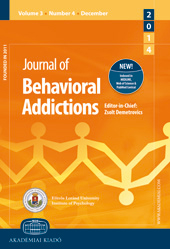The use of naltrexone in pathological and problem gambling: A UK case series
The use of naltrexone in pathological and problem gambling: A UK case series
Author(s): Sophie Ward, Neil Smith, Henrieta Bowden-JonesSubject(s): Behaviorism
Published by: Akadémiai Kiadó
Keywords: naltrexone; gambling disorder; UK
Summary/Abstract: To investigate the potential indications and adverse effects of using the opioid antagonist naltrexone to treat problem gamblers. Case presentation. The files of the 1,192 patients who were referred to the National Problem Gambling Clinic between January 2015 and June 2016 were audited. Seventeen patients were considered appropriate for treatment with naltrexone, having attended and failed to respond to psychological therapies at the clinic. Fourteen patients were placed on a regimen of 50 mg/day naltrexone. Discussion. Of the 14 patients who were treated with naltrexone, there were 10 for whom sufficient follow-up existed to analyze the treatment efficacy and side effects of naltrexone. Patients showed significant decreases in their craving to gamble and the majority (60%) were able to abstain completely from gambling in the treatment period, with a further 20% reducing their gambling to almost nothing. The reported side effects from the naltrexone included: loss of appetite, gastrointestinal pain, headaches, sedation, dizziness, and vivid dreams. Two patients with concurrent alcohol-use disorder relapsed during the treatment. One patient relapsed after the treatment period. Conclusions. The study showed significant outcomes in reducing gambling cravings for the sample set. Given the design of the study as a case series, there was no control group, and a number of patients were on other psychotropic medications. We recommend care when prescribing to those suffering from concurrent alcohol-use disorder.
Journal: Journal of Behavioral Addictions
- Issue Year: 7/2018
- Issue No: 3
- Page Range: 827-833
- Page Count: 7
- Language: English

